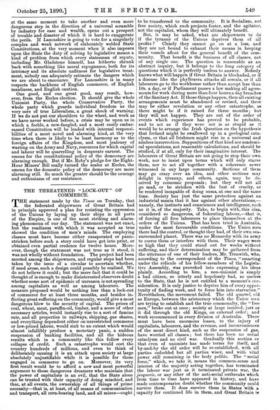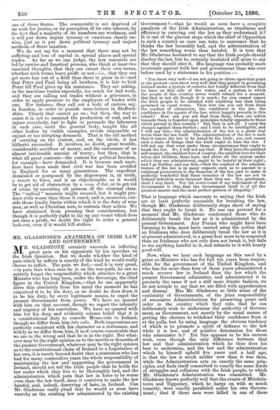ricti, THREATENED " LOCK-OUT " OF COMMERCE. T HE statement made
by the Times on Tuesday, that the federated shipowners of Great Britain had in principle approved a plan for resisting the oppression of the Unions by laying up their ships in all ports of the Empire, is one of the most striking and alarm- ing phenomena of our day. The statement was not exact, but the readiness with which it was accepted as true showed the condition of men's minds. The employing classes must have become either exasperated or panic- stricken before such a story could have got into print, or obtained even partial credence for twelve hours. More- over, though the statement was not true as it stood, it was not wholly without foundation. The project had been mooted among the shipowners, and regular steps had been taken by the issue of a circular to ascertain whether, if need arose, such a design could possibly be realised. We do not believe it could ; but the mere fact that it could be thought of is enough to make disinterested observers doubt whether some sort of epidemic of unreason is not spreading among capitalists as well as among labourers. The measure proposed would be nothing less than a lock-out of commerce for at least three months, and besides in- flicting great suffering on the community, would give a most dangerous blow to the security of capital. The prices of coal, wheat, meat, paraffin-oil, timber, and a score of other necessary articles, would instantly rise to a sort of famine rate, and all properties in railways, shipping, gas shares, and everything dependent either on unrestricted commerce or low-priced labour, would. sink to an extent which would almost infallibly produce a monetary panic, a sudden suspension of banking facilities, and all the hideous results which in a community like this follow every collapse of credit. Such a catastrophe would cost the country hundreds of millions, and even to think of deliberately causing it is an attack upon society at large absolutely unjustifiable while it is possible for those engaged in commerce to go on. Moreover, its very first result would be to afford a new and most powerful argument to those dangerous dreamers who maintain that the power of capitalists is an evil, that the State alone can be trusted with their capacity of doing mischief, and that, at all events, the ownership of all things of prime necessity—that is, at least, of all means of communication and transport, all corn-bearing land, and all mines—ought to be transferred to the community. It is Socialism, not free society, which such projects foster, and the agitator, not the capitalist, whom they will ultimately benefit. But, it may be asked, what are shipowners to do if the tyranny of the Unions deprives them of all profits ? Clearly they cannot go on at a loss, and they are not bound to exhaust their means in keeping their vessels afloat- for the general benefit of the com- munity. That benefit is the business of all classes, not of any single one. The question is reasonable as an abstract inquiry, but it belongs to the long category of questions which it is perfectly useless to answer. Nobody knows what will happen if Great Britain is blockaded, or if a disease like the phylloxera attacks all cereals, or if all labourers go to the workhouse rather than accept less than 10s. a day, or if Parliament passes a law making all agree- ments for work during more than four hours a day breaches of the Sanitary Act. If those things happen, then all existing arrangements must be abandoned or revised, and there may be either revolution or any other catastrophe, as there might be if it rained for three months ; but they will not happen. They are out of the order of events which experience has proved to be probable, and to act as if they were not is as stupid as it would be to arrange the Irish Question on the hypothesis that Ireland might be swallowed up in a geological cata- clysm, or that all Irishmen might rise in a universal and aimless insurrection. Suppositions of that kind are academi- cal speculations, not reasonable calculations, and should be studied, if at all, only for their imaginative interest. The labourers of Great Britain are not going to stop their own work, nor to insist upon terms which will only starve them, nor to act all together with a coherence never witnessed in any large community. Sections of them may go crazy over an idea, and other sections may delight in tyranny, and others, again, may be de- ceived by economic proposals ; but they will not all go mad, or be stricken with the lust of cruelty, or be rendered incapable of doing sums, at one and the same time. Society has just the same protection against an industrial mania that it has against other aberrations,— namely, the instincts and consciences and intelligence, such as it is, of the majority. Take, to begin with, this idea, considered so dangerous, of federating labour,—that is, of forcing all free labourers to place themselves at the orders of the Unions. That has been tried in Australia, under the most favourable conditions. The Union men there had the control, or thought they had, of their own sea- surrounded planet. There was no Monarchy with its army to coerce them or interfere with them. Their wages were so high that they could stand out for weeks without suffering, and their determination may be gathered from the utterance of one of their leaders, Mr. Trenwith, who, according to the correspondent of the Times, " smarting under the ridicule of his fellow-members of the Legisla- tive Assembly, was provoked into expressing his ideas plainly. According to him, a non-unionist is simply a bad citizen, so utterly and hopelessly bad, so useless to the State, that he is not entitled to a moment's con- sideration. It is only justice to deprive him of every oppor- tunity of finding work, and to force him into starvation." Nevertheless, the movement failed. The old quarrel, old as Europe, between the aristocracy which the Union men are trying to establish and the true commonalty, the " free men," broke out at once ; society at large insisted, just as it did through the old Kings, on external order ; and work recommenced in every division of Australia. There must have been enormous losses, to the injury of capitalists, labourers, and the revenue, and inconveniences of the most direct kind, such as the suspension of gas, have worried all classes ; but there has been no social cataclysm and no civil war. Gradually this section or that even of unionists has made terms for itself, and by-and-by the old order will be re-established, with all parties enfeebled but all parties wiser, and with vital power still remaining in the body politic. The " social force," which, we take it, means the common-sense and interest of the majority acting together, has terminated the labour war just as it terminated private war, the jacquerie, or any other of the anti-social outbreaks which from time to time have appeared. in history, and have made contemporaries doubt whether the community could survive them. It does survive them in States with a capacity for continued life in them, and Great Britain is one of those States. The community is not deprived of its wish for justice, or its perception of its own interest, by the fact that a majority of its members are workmen, and it will put' down unjust tyranny or exactions clearly un- wise, just' as it put down political tyranny and unjust methods of State taxation.
We do not say for a moment that there may not be suffering and loss of capital in special places and special trades. As far as we can judge, the new unionists are led by unwise and fanatical persons, who think at least two unsound thoughts, that they can extort their own terms, whether such terms leave profit or not—i.e., that they can get more hay out of a field than there is grass in it—and that Peter and Paul being all brethren, it is fair to kick Peter till Paul gives up his resistance. They are asking, in. the maritime trades especially, too much for bad work, and they are calling out trades without a grievance, in order to apply pressure to the employers of trades with one. For instance, they call out a body of carters, say, in London, in order to punish mine-lessees in Stafford- shire. Clearly that cannot go on ; but then, the way to resist it is, not to suspend the production of coal, and so injure everybody, but to fight or persuade the labourers in each case, until the general body, taught like all other bodies by visible examples, avoids impossible or unjust or too irritating demands. That is the old method of carrying on the contest, and, on the whole, it has hitherto succeeded. It involves, no doubt, great trouble, considerable sacrifices of money, and the endurance of an almost intolerable amount of worry; but then, that is what all great contests—the contest for political freedom, for example—have demanded. It is because such sacri- fices have been made that civil war has been avoided in England for so many generations. The expedient dismissed or postponed by the shipowners is, in truth, a resort to force, and is as objectionable as it would be to get rid of obstruction by a coup cretat, or to get rid of crime by executing all persons of the criminal class. The " radical " measure might succeed, but it might pro- duce evils worse than those it cured, and is, moreover, out- side those kindly limits within which it is the duty of wise men, as well as Christian men, to restrain their action. We have abstained from pressing that consideration, but though it is perfectly right to lay up any vessel which does not earn a profit, we doubt the right to order a general lack-out, even if it would kill strikes.







































 Previous page
Previous page